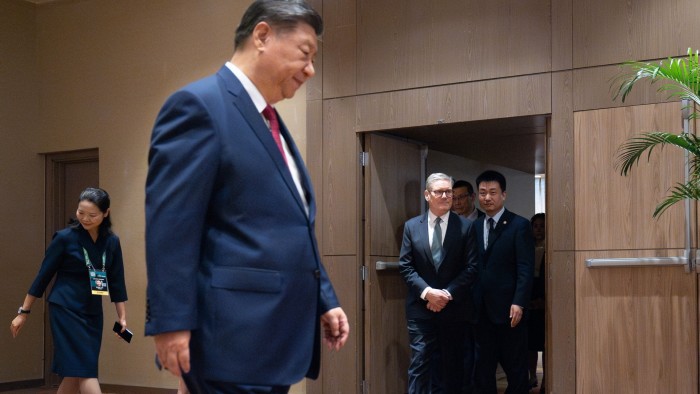Britain needs a coherent China strategy

Unlock the Editor’s Digest for free
Roula Khalaf, Editor of the FT, selects her favourite stories in this weekly newsletter.
The handshake with which Xi Jinping, China’s leader, greeted UK Prime Minister Sir Keir Starmer on Monday was anything but warm. Footage from the G20 summit in Rio de Janeiro showed a grim-faced Xi briefly clasping hands with Starmer, before dismissively gesturing him towards a meeting table. The brief encounter yielded an insight into the sour state of UK-China ties.
The leaders of the other six G7 countries have all met Xi since the global pandemic eased in 2022. Starmer’s meeting was the first between Xi and a UK leader since 2018. Not only have meetings been absent; so, too, has been much evidence of a coherent UK policy towards Beijing.
The Labour government is hoping for a fresh start. Starmer wants to forge a “serious and pragmatic” relationship with China, while “being clear about the issues that we do not agree on”. He told Xi that he wishes to hold a full bilateral meeting between the two countries as soon as possible. Xi said Beijing and London would “break new ground” in the relationship, without specifying how this might happen.
Starmer’s broad approach so far is welcome, including his promise that the UK will be “a predictable, consistent, sovereign actor committed to the rule of law”. But this will not be nearly enough to manage a complex relationship with China when London is set to come under pressure from a new Trump administration that will be far more hawkish towards Beijing. That makes it all the more important for Britain to define its own priorities and interests.
The UK needs, above all, to develop a clear China strategy. Most important will be deciding where its “red lines” with Beijing lie. The UK — and its business sector — will then be free to engage with vigour in all areas not circumscribed by national security and other crucial concerns. A “China audit” currently under way in London to “understand and respond to the challenges and opportunities China poses” provides a vehicle for such an effort.
Detailed work is required. China’s pricing power in technologies such as wind and solar power, for instance, makes the prospect of Chinese plants in the UK potentially attractive. But the question of how much Britain is ready to depend for infrastructure on a rival must be addressed, along with the potential for data transfer from such facilities back to China.
Getting ahead of such issues might allow the UK to avoid the type of messy reversal it suffered with telecoms networks installed by Chinese tech giant Huawei. Under US pressure, London decided in 2020 to strip out Huawei’s 5G networks by the end of 2027, marking a U-turn from previous policy and imposing huge costs on the UK economy.
There are other technological concerns to address. China is the world’s leading and lowest-cost provider of cellular modules, which facilitate internet links with a variety of everyday items such as routers, smart meters, cars, manufacturing systems and many more. Such modules are vulnerable to malware and even to being turned off by their suppliers, researchers say.
Human rights provide further “red lines”. Starmer rightly raised the treatment of the imprisoned Hong Kong democracy activist Jimmy Lai in his meeting with Xi. Starmer has said the release of Lai, a British citizen, is a priority for his government. The sharp divergence between UK and Chinese values was underlined hours after the meeting when 45 of Hong Kong’s leading pro-democracy figures were sentenced to jail — one for 10 years — in the largest national security trial in the former British territory.
Even as it seeks to preserve commercial ties with China, the UK should be robust on its national security and values. Only by adhering to such bedrock principles can Starmer realise his promise that the UK’s ties with Beijing will become “predictable” and “consistent”.
#Britain #coherent #China #strategy





